|
Sandip Wilson With spare text and varied line breaks, novels in which the narrative is told through poetry can present stories with complex topics, themes, and issues in a format that appeals to readers and helps them understand voices, events, characters, and narrators in new ways. Nonfiction in verse, also included in this column, provides insight into other times and places.  Good Different. Meg Eden Kuyatt. (2023). Scholastic. Twelve-year-old autistic Selah just wants to get through seventh grade at Pepplecreek Academy and is trying to be “a Normal person” like her mother wants her to be. However, when Selah reacts to classmate Addie’s wanting to braid her hair and accidentally striking her and drawing blood, she is considered dangerous and is suspended from school for three days. Upon her return to school, Shelah finds a way to express herself when her favorite teacher has students write poetry. “My feelings are loud. Rude. / BIG. Sometimes / angry.” Using birthday tickets from her mother, Saleh attends Fantasycon where she meets other people on the autistic spectrum, who are like her “when everything feels / like it‘s pouring in / and there’s no room / for . . . feelings to go,” setting her on a path of self-discovery. The author’s note for this novel in verse celebrating differences and finding one’s place in the world includes information on Meg Eden Kuyatt’s experiences with autism, resources, and acknowledgements. (Gr 3-5) 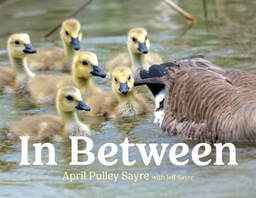 The In-Between. Katie Van Heidrich. (2023). Aladdin. Thirteen-year-old Katie finds herself in the in-between—“when you’re in between / where you want to be and where you are, / when you’re in between what you previously had / and what you so desperately want to have back, . . .”—while her family is in crisis. She, her siblings Josh and Haley, and their mother, who is cycling through jobs, find themselves living in a room at the Extended Stay America hotel with their possessions, which have been whittled down to a precious few with the multiple changes in their lives. With lyrical lines, Katie explains her feelings in going to yet another new school, spending weekends with their father, his new wife, and their baby in their spacious home, and their unemployed mother’s searching for yet another new job. Katie finds solace and continuity in writing in her notebook. She likes to play with words and discover the meaning of new words. “Words, / after all, / have power,” and they provide “new ways of knowing / and understanding, / and being.” The back matter of this memoir in verse of forging friendship, loss and discovery, new beginnings, and perseverance includes archival photographs of the three siblings at different points in their lives with their parents. (Gr 3 Up) 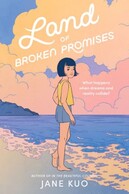 Land of Broken Promises. Jane Kuo. (2023). Quill Tree. In this sequel to In the Beautiful Country (2022), 12-year-old Ai Shi (Anna) Zhang and her family are carving out a new life in Duarte, in the Los Angeles area, where they operate a fast-food restaurant. Anna would like to spend summer vacation returning to Taiwan for a visit or joining her friends at summer camp, but when the Zhangs discover they missed the due date for renewing their immigration status, plans for the summer change. Anna’s mother goes to San Diego for a good paying job, leaving Anna to help her father run the restaurant, in an attempt to raise enough money to hire an immigration lawyer. In the back matter, Jane Kuo explains that her experiences in the 1980s of living in the Los Angeles area as an undocumented immigrant for years before becoming a citizen served as a model for this novel, written in first-person free verse, about the resilience, perseverance, and optimism of a young Taiwanese immigrant. (Gr 3 Up) 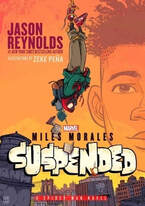 Miles Morales Suspended: A Spider-Man Novel. Jason Reynolds. Illus. by Zeke Peña. (2023). Caitlyn Dlouhy. Written in a hybrid verse/prose format, this sequel to Miles Morales: Spider-Man (2017) chronicles Miles Morales’s day in ISS (In-School Suspension) at Brooklyn Visions Academy, a boarding school, as a result of breaking his desk and participating in a protest with Alicia Carson, the classmate on whom he has a crush, over racist treatment from one teacher, Mr. Chamberlain. Jason Reynolds tells the story through a third-person narrative and Miles’s first-person poems. As Miles tries to concentrate on completing the day’s class assignments, his keen spider-man senses have him hearing buzzing in the walls and seeing termites. Becoming more and more concerned about Tobin, the book-eating classmate in ISS for destroying library books, Miles soon finds himself involved in yet another high-flying heroic deed. Zeke Peña’s dramatic illustrations rendered digitally convey Tobin’s transformation and the climactic encounter between him and Miles. The acknowledgements in the back matter include information on writing the book. (Gr 6 Up) 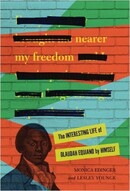 Nearer My Freedom: The Interesting Life of Olaudah Equiano by Himself. Monica Edinger & Lesley Younge. (2023). Zest. This found poetry version of the life story of Olaudah Equiano (1745-1797) was “created using words, phrases, and quotes from text rearranged into verse” from Equiano’s autobiography, The Interesting Narrative of the Life of Olaudah, or Gustavus Vassa, the African, Written by Himself, originally published in 1789. Monica Edinger and Lesley Younge add informative notes and archival images tracing the historical context to the chapters. Equiano, who was born in Essaka, Benin, in what is now Nigeria, explains the rich life of the people and the horrors of abductions and trade. “Again sold. / Again carried through a number of places.” In England, at the age of 12, he became a slave for ship captains and began a seafaring career to the western hemisphere, reckoning with experiences of masters who were either duplicitous or kind and demonstrating his multiple skills including literacy. Later, serving the slave trade as a free seaman, Equiano came to understand that his freedom, which he purchased in 1766, would always be at risk and he became an abolitionist. The release of the first edition of Equiano’s autobiography was timed to "coincide with an important debate over slavery in Parliament." The back matter of Edinger and Younge’s engaging and accessible book includes a “Creating a Verse Version” section, a timeline, a glossary, source notes, a bibliography, suggestions for further reading, and an index. (Gr 9-12) 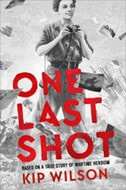 One Last Shot: The Story of Wartime Photographer Gerda Taro. Kip Wilson. (2023). Versify. In this historical verse novel written as a first-person narrative, Kip Wilson tells the life story of Gerda Taro (1910-1937), born Gerda Pohorylle into a Polish Jewish immigrant family in Stuttgart, Germany. At the age of 16, she attended a boarding school in Switzerland for a year where she proved independent in her interests and became fascinated with cameras before returning to Germany. Released after imprisonment for distributing anti-Nazi propaganda, and holding a Polish passport in a country that was becoming more perilous for Jews, she fled to Paris in 1933 where she soon realized that Paris was also dangerous when she heard the French say foreigners “were stealing French jobs.” Her life changed when she met and fell in love with Hungarian photographer André Friedmann (1913-1954) with whom she pursued her interest in cameras and photography while they worked under the names Gerda Taro and Robert Capa. Her love and radical politics took Gerda on assignments to document the growing conflict in Spain where, in 1937, she tragically became the first woman photojournalist ever killed in combat. Extensive back matter includes a “Dramatis Personae” section with brief biographical notes; an author’s note in which Wilson explains her inspiration and the fact-or-fiction aspects of this historical verse novel, the context of the Spanish Civil War (1936-1939), and Gerda Taro’s legacy; acknowledgments; selected sources; and a glossary of German, French, and Spanish words. (Gr 9-12) 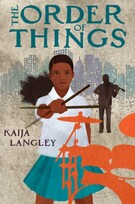 The Order of Things. Kaija Langley. (2023). Nancy Paulsen. April Jackson lives with her mother in a Boston apartment across the hall from Zander (Zee) Ellis and his father. Best friends who share a love of music, Zee is a violin prodigy and April, who has always dreamed of being a drummer, is taking lessons from Papa Zee on a drum kit in the Ellis’s apartment. April and Zee have been inseparable their whole lives, but now Zee attends a Boston STEAM charter school with an emphasis on the arts while April starts sixth grade at their old school and finds herself paired for class projects with awkward Astrea Curtis. When Zee faints while practicing for a major solo, begs April to keep silent after another episode, and later is found dead at school, she is grief-stricken and feels responsible because of her promise to say nothing. April makes discoveries about herself as she deals with her grief and comes to terms with changes in her family and friendships in this richly detailed novel of deep emotions and shifts in the order of things with Kaija Langley’s sensitively crafted short poems. The author’s note includes information on sudden cardiac arrest. (Gr 6-8) 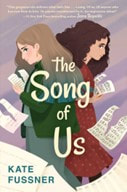 The Song of Us. Kate Fussner. (2023) Katherine Tegen. Seventh-grade student Olivia, co-founder of the Poetry Club with her friend Lexi, promises to “work wonders with my words / . . . master meter / draft delight” this year but is mesmerized when a beautiful, new student, Eden, a musician, joins the club. In alternating voices, Olivia and Eden rhapsodize about their growing attraction for one another, complete with kisses after school, but their intense attraction changes to conflict in face of Eden’s secrecy about her identity and interests in other friends and boys, and Olivia’s open devotion to Eden. Olivia, who lives with a depressed mother, and Eden, who lives with a silent, distant father since her mother left, do not talk to their parents about their relationship, which grows in complexity. This refashioning of the Greek myth “Orpheus and Eurydice” is a story of love and loss and finding ways to heal and transform oneself. (Gr 6 Up) 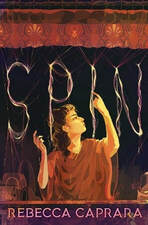 Spin. Rebecca Caprara. (2023). Atheneum. Living in ancient Thrace, 15-year-old Arachne, whose mother is a skilled weaver and herbalist and father is a master dyer, learns and practices the art of spinning with patience. Woven through this retelling of the myth of Arachne in Rebecca Capara’s lush verse novel are elements of other Greek myths as Arachne wonders why women such as Pandora and Medea are blamed and punished for mishaps while men “are celebrated / for much worse—their violence . . . / revered as necessary, noble acts.” She is angered by the liberty of men that overpowers women. As her mother teaches Arachne the art of weaving and collecting and using herbs, she tells her ancient myths, advising Arachne “to question / the stories you hear.” When Photis, her younger brother, dies falling from a tree he climbs and in unfathomable grief, her mother sickens and dies and her father becomes distant, Arachne leaves for Colophon, where she trades her beautiful tapestries. After the colorful realistic depiction of people and daily scenes in Arachne’s tapestries becomes more celebrated than the reverence to the gods rendered in Athena’s tapestry, the goddess Athena challenges her to a weaving competition. The curse, precipitated by Athena’s wrath toward the young weaver, allows Arachne to help women in a way she didn’t expect in this novel of resourcefulness, courage, and standing up for oneself. The back matter includes information on source material in the acknowledgments. (Gr 9-12) 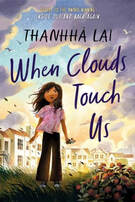 When Clouds Touch Us. Thanhhà Lại . (2023). Harper. In this sequel to Inside Out and Back Again (2011), 12-year-old Hà recalls the family’s fleeing the war in Vietnam two years ago to a safer, better life in America as her mother tells her and her brothers that they will be leaving Alabama for Texas for better employment opportunities. Hà objects to the thought of leaving her friends and the school where she is now settled. In this verse novel, she recounts the year of the family’s uprooting from Alabama, taking with them one pillowcase of clothes each, a bare minimum of possessions, and “treasures from across the sea,” and starting all over again in Texas in a new school where she tries to develop new friendships and meets new challenges in learning English while holding onto the traditions of her Vietnamese culture. This thought-provoking novel shows hope in creating a new life while honoring the past. “I ache to know / how much longer / until clouds touch us, / ending refugee living.” The back matter includes an author’s note explaining the rationale for the sequel and writing in verse. (Gr 3 Up) Sandip Wilson is a professor in the School of Education and Department of English of Husson University, Bangor, Maine, and serves as President of the CL/R SIG 2022-2024.
0 Comments
Leave a Reply. |
AuthorsThese reviews are submitted by members of the International Literacy Association's Children's Literature and Reading Special Interest Group (CL/R SIG). Archives
May 2024
Categories
|

 RSS Feed
RSS Feed